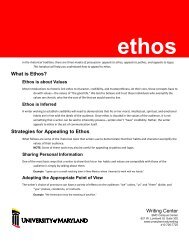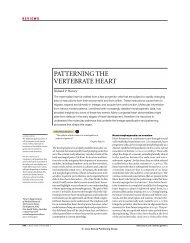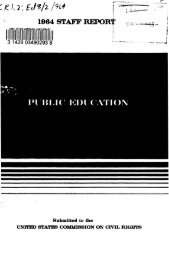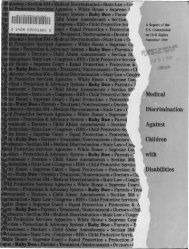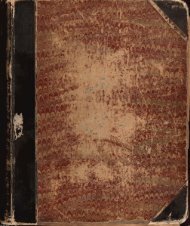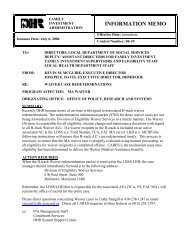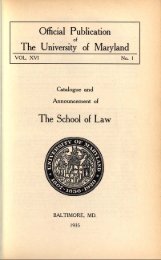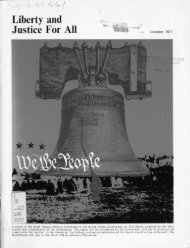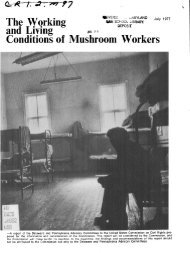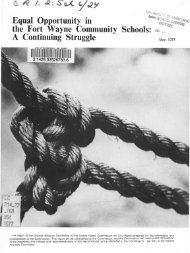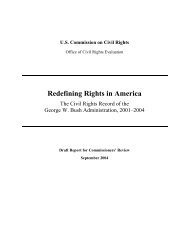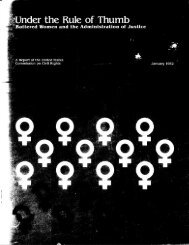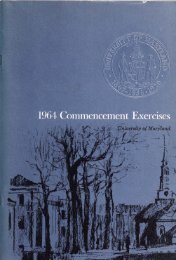1961 US Commission on Civil Rights Report Book 2 - University of ...
1961 US Commission on Civil Rights Report Book 2 - University of ...
1961 US Commission on Civil Rights Report Book 2 - University of ...
You also want an ePaper? Increase the reach of your titles
YUMPU automatically turns print PDFs into web optimized ePapers that Google loves.
Documentati<strong>on</strong>-<strong>Book</strong> 2<br />
NOTES: EDUCATION, Chapter 1<br />
1. 347 U.S. 483 (1954).<br />
2. Id. at 493.<br />
3. <strong>Civil</strong> <strong>Rights</strong> Act <strong>of</strong> 1957, sees. ic>4(a) (2) and (3), 71 Stat. 635,<br />
42 U.S.C., sec. i975c(a) (i95 8 )-<br />
4. United States <str<strong>on</strong>g>Commissi<strong>on</strong></str<strong>on</strong>g> <strong>on</strong> <strong>Civil</strong> <strong>Rights</strong>, Equal Protecti<strong>on</strong> <strong>of</strong> the<br />
Laws in Public Higher Educati<strong>on</strong>, ig6o (hereinafter cited to as<br />
Higher Educati<strong>on</strong> <strong>Report</strong>).<br />
5. The 17 Southern States requiring racially segregated schools were:<br />
Alabama, Arkansas, Delaware, Florida, Georgia, Kentucky, Louisiana,<br />
Maryland, Mississippi, Missouri, North Carolina, Oklahoma,<br />
South Carolina, Tennessee, Texas, Virginia, and West Virginia.<br />
The three States permitting segregati<strong>on</strong> under certain circumstances<br />
were: Ariz<strong>on</strong>a, Kansas, and New Mexico. Additi<strong>on</strong>ally, the laws<br />
<strong>of</strong> the State <strong>of</strong> Wyoming permitted segregated schools but, in fact,<br />
n<strong>on</strong>e were ever established.<br />
6. Taylor v. Bd. <strong>of</strong> Educati<strong>on</strong> <strong>of</strong> New Rochelle, N.Y., 191 F. Supp. 181<br />
(S.D. N.Y. <str<strong>on</strong>g>1961</str<strong>on</strong>g>), aff'd F. 2d (ad Cir. <str<strong>on</strong>g>1961</str<strong>on</strong>g>). A classificati<strong>on</strong><br />
based <strong>on</strong> race, religi<strong>on</strong> or nati<strong>on</strong>al origin has been held to be arbitrary,<br />
hence, a denial <strong>of</strong> equal protecti<strong>on</strong> <strong>of</strong> the laws. See Hernandez<br />
v. Texas, 347 U.S. 475, 477-78 (1954) (nati<strong>on</strong>al origin);<br />
Yick Wo v. Hopkins, 118 U.S. 356, 369 (1886) (race, color, or<br />
nati<strong>on</strong>ality); Harris v. Sunset Islands Property Owners, Inc., 116<br />
S. 2d 622, 625 (Fla. 1959) (religi<strong>on</strong>). See also Griffin v. Illinois,<br />
351 U.S. 12, 17 (1956) (poverty no more than religi<strong>on</strong>, race, or<br />
color).<br />
7. 70 Stat. 293, as amended, 20 U.S.C. sees. 351-58 (1958).<br />
8. 18 U.S.C. sec. 1509 (Supp. II, 1959-60).<br />
9. <strong>Report</strong> <strong>of</strong> the United States <str<strong>on</strong>g>Commissi<strong>on</strong></str<strong>on</strong>g> <strong>on</strong> <strong>Civil</strong> <strong>Rights</strong>, 1959 at<br />
324 (hereinafter cited as 1959 <strong>Report</strong>.)<br />
i o. "Where the Great Change Took Place," New York Times Magazine,<br />
February 5, <str<strong>on</strong>g>1961</str<strong>on</strong>g>, p. 68.<br />
187



